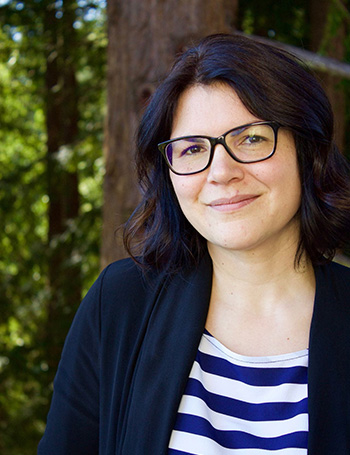Campus News
Ocean scientist Claudie Beaulieu wins NSF CAREER Award
Claudie Beaulieu, assistant professor of ocean sciences, has received a Faculty Early Career Development (CAREER) Award from the National Science Foundation (NSF) to support her work using data science to study climate variability and climate change.

Claudie Beaulieu, assistant professor of ocean sciences at UC Santa Cruz, has received a Faculty Early Career Development (CAREER) Award from the National Science Foundation (NSF) to support her work using data science to study climate variability and climate change.
Beaulieu’s research program is motivated by the need to understand the drivers of variability and change in the ocean and climate, and it addresses the challenge of harnessing increasingly complex environmental data. The NSF CAREER Award will support an integrated research and education program focused on the observed and future rate of climate change, which has implications for societies and the environment.
“This project represents the culmination of several years of research, mentoring, training, and teaching in the emerging field of environmental data science, integrating my work on climate and environmental change with my expertise in statistics to synergistically advance research and education,” Beaulieu said. “My overarching goal is to gain a better understanding of climate variability and change through a data science approach, and I am devoted to the training of the next generation of environmental scientists with skills to analyze the rapidly growing store of environmental data to meet this aim.”
Recent advances in climate and ocean monitoring, observational platforms, measurement techniques, and Earth system models have contributed to a rapid increase in the quality and quantity of available data. Beaulieu’s efforts are based on a range of interdisciplinary approaches that implement statistical and machine learning techniques to make the best use of both observational data and outputs from model simulations.
In climate research, the rate of warming has been given less attention than the amount of warming, but both are important to monitor. While some economic sectors, ecosystems, and species are directly affected by the actual temperature, others are sensitive to the pace of change as they need time to adapt, migrate, or otherwise reach a new sustainable state.
The rate of climate change is not uniform in space or time. Beaulieu said she expects there are coherent systems of changes in the warming rate that can be detected in historical data and tied to specific combinations of natural and anthropogenic drivers. “These systems are likely increasing in frequency, extent, and magnitude as we advance into and through this century,” she said.
Beaulieu’s project will focus on detecting coherent systems of warming rate changes, understanding the drivers of these systems of change, and projecting their future evolution in frequency and extent through the end of this century.
In concert with this research, she plans to develop related resources for students, managers, policy-makers, and the wider public. The goal is to help fill the current gap in data science training in environmental sciences curricula and broaden participation in STEM.
Her team will also develop a user-friendly dashboard to visualize and monitor the pace of temperature change for different parts of the world, and to identify regions with accelerated rates of warming as quickly as possible. The dashboard will specifically monitor temperature change on Indigenous ancestral lands. Beaulieu said she is particularly excited that the NSF CAREER award will enable her to focus on Indigenous territories, as a resource to traditional stewards of the land, and by the opportunity to integrate these new findings into climate change research, outreach, and education.
“Monitoring the pace of climate change is crucial for communities at risk to communicate impacts and make timely and informed decisions,” Beaulieu said.
Beaulieu earned a Ph.D. in water sciences at the Institut National de la Recherche Scientifique Centre Eau Terre et Environnement in Quebec, followed by postdoctoral research in atmospheric and oceanic sciences at Princeton University. She was a lecturer in the School of Ocean and Earth Science at University of Southampton prior to joining the UCSC faculty in 2018.